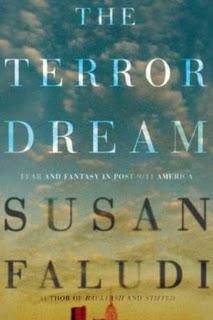The Terror Dream: Myth and Misogyny in an Insecure America

Many people are rightfully weary of discussing and analyzing 9/11. While it could be labeled insensitivity, it more likely has to do with a stifled national discourse, repugnant media spin, and a lack of in-depth processing. For the past several years, we’ve all been hibernating, trying to escape the aftermath of the terrorist attacks rather than actively deconstruct their meaning. The myth of American national security was shattered in 2001, and our belief that we—both as a nation and as individuals—could protect ourselves has evaporated.
Instead of productively handling this mass psychosis or treating the 9/11 terror attacks like another criminal act, its meaning has been buried under patriotic language, hyper-masculine war costumes, and false reports of our collective return to domesticity. In the face of our personal terrors, the media created a different account of our collective experience, marked by disturbing gender binaries and renewed focus on dismantling feminist achievement. Rather than following what should have been a thorough plan to prosecute the terrorists responsible, the news media pounced on feminism, blaming radical women for the attacks as supposed champions of the “soft” values that made the U.S. a vulnerable target.
The collective inability to make meaning of 9/11, to give the story a voice, is what Susan Faludi attempts to name in The Terror Dream. Mainstream media interpretations—from films like United 93 and Oliver Stone’s World Trade Center to television shows like Rescue Me and the off-Broadway play The Guys—have only served to regurgitate the timeline, replay the events of that day, celebrate the men—and only the men—who served their city and country. No major productions have attempted to dig deeper into what it has meant for American diplomacy, hero myths, or gender.
While the U.S. government temporarily showed an interest in “freeing” the veiled women in the Middle East, American women—specifically female fire fighters and policewomen—might as well have been wearing veils for all the attention they were given in the media. Female writers who called for a collective healing, for deconstruction, for a larger discussion about religion, terror, and diplomacy were silenced. Ignored or publicly belittled before being deemed irrelevant, some of the greatest women in modern journalism, social justice, and literature were thrown under the bus. Katha Pollit, Susan Sontag, Barbara Kingsolver, and Arundhati Roy were among the many once-prominent female commentators that quickly became the media’s proverbial whipping boys. Of course if they had been boys, they would have likely been handed a comic book, asked to show up on Fox News as a talking head, and told to fight like a man. Faludi devotes an entire chapter of The Terror Dream to the story of Jessica Lynch, a U.S. soldier in Iraq who made headlines when the story of her “rescue” was spun into yet another tale of the brave men saving a defenseless women (nevermind the implicit racism that the white soldiers saved Lynch from the Arab savages).
Explaining 9/11 to ourselves is perhaps even trickier when the Bush administration couldn't explain it either. Faludi points out that President Bush’s reaction that the attacks were “unimaginable” could explain his painful blundering and his inability to act with dignified transparency and reasoned authority. Trauma can cause extreme reactions, and many went into hiding, waiting for the nightmare to end. No one was able to rouse us to collectively meet our horror head on, to question what it meant so that we could move forward, because we had a president more focused on cowboy-themed catchphrases than leadership.
Faludi is perhaps the only person who could have written this book. Her thorough understanding of the way in which American culture, gender relations, and politics fuse together makes her one of the greatest living feminist journalists. She is able to tease out truths where the rest of us are still left scratching our heads. While other brilliant female journalists, like Naomi Klein, have dismantled terrorism myths to point to a hidden agenda—in Klein’s case, a disaster capitalist dismantling and rebirth of Iraq and Afghanistan, coupled with U.S. profits from the reconstruction plans—it has been difficult to name what has happened to the American psyche and specific gender ideals and relations. Deconstructing comic-book style firefighter hero myths, the return of the cowboy narrative, the Bush administration’s brief flirtation with Muslim women’s rights, and the almost complete vanishing of female voices of dissent (and reason) in the media in the aftermath of 9/11, Faludi explains the global inability to make sense of the media’s response to the trade center attacks, as well as our own inability to understand our personal reactions.
Thanks Lawrence! I'd admit that this was a difficult book to review, in part because I'm so enamored with Faludi and the book's premise. It's a stunning read, and I would get through maybe five pages when so much would begin to crystallize, I'd have to sit and think about it for a day before diving back in. The further along you get, the easier it becomes to get into the flow, but the first two chapters really knocked me off my feet. I hope you enjoy it!-brittany
Thanks for your review of this important work, Brittany, which I (now) look forward to reading. Backlash made a real impression on me long ago, so it's not surprising that Faludi would have this kind of book in here. I've been catching little glimmers of her thesis pop up, too, for example, the hammering that Maggie Gyllenhall took just afterwards when all she did is suggest that perhaps Americans should think about things, before reacting.Cheers.Lawrence Hammar